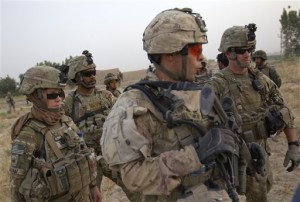
US SOLDIERS ON PATROL IN AFGHANISTAN. "Army life is tough, this is a stressful environment…there are bad days here, IEDs (improvised explosive devices) and small arms fire.”
KHOST – Darby Ortego, 25, endures gunfire and mine attacks fighting for the United States army in Afghanistan, but this July 4 will be his first as a citizen of the country he serves.
Ortego, who battles insurgents in the violent eastern province of Khost with Bravo Company, 1-26 Infantry, recently attended a naturalisation ceremony at a US base near Kabul ahead of this year’s Independence Day celebrations.
Like thousands of fellow Filipinos, he sees the US military as a fast-track to American citizenship, securing his own future and also helping his family back home.
“I joined up to get my mom to America,” said Private Ortego, who is deployed at Combat Outpost Sabari in Khost, where US troops clash with Taliban rebels based across the border in Pakistan.
“I want to bring my mom from her village in the Philippines to Nevada, where I live. I want her to be with me.”
Ortego is one of the roughly 9,000 legal immigrants who join the US armed forces each year from countries as far apart as Panama, Nigeria, Liberia and Turkey.
He has “Green Card” permanent residency in the US, and was living with his divorced father in Nevada when he signed up for the army two years ago.
Other benefits to military service include a free college education, which Ortego says he hopes to use to study business management.
Troop commanders say new citizens fight hard for their privileges.
“He volunteered to serve in the army, so he certainly deserves to raise his right hand and take the citizenship oath,” said Ortego’s commanding officer Captain Aaron Tapalman.
“Like all soldiers going through the citizenship process, he has always felt completely part of the team. You wouldn’t know unless these guys tell you.”
There are around 25,000 non-US citizens serving in the military, the Pentagon says.
Non-citizens have fought for the US since the 18th century War of Independence, while the US officially started recruiting Filipinos after World War II when it opened military bases in the Philippines.
After the 9/11 attacks in 2001, the naturalisation process for military personnel was streamlined when President George W. Bush scrapped waiting requirements for active soldiers.
In the last 10 years, nearly 69,000 immigrant troops have become US citizens while serving.
Naturalisation takes just months for serving military personnel compared to years for regular legal immigrants.
Unemployment and poverty in their homeland have driven millions of Filipinos abroad to search for work, often on construction sites or as domestic staff.
“It is better in the US because there are more opportunities. You can find a job and they will pay a decent amount,” said Ortego, who sends money back to his family in Northern Samar province.
But the sacrifices he now has to make for himself and his mother are significant.
“Army life is tough, this is a stressful environment,” he said. “There are bad days here, IEDs (improvised explosive devices) and small arms fire.
“My mom is scared for me. It is a mother’s thing. She misses me a lot, I’ve only seen her briefly once in the last two years when she stopped overnight in Los Angeles just to say hi.
“I keep telling her, when I get citizenship, you guys are going to be in the US with me.”
In the week leading up to July 4 this year more than 24,000 new Americans — civilian and military — are passing through naturalisation ceremonies, the US Citizenship and Immigration Services said, with events for members of the armed forces being held in Kuwait and Baghdad as well as Kabul.
At an often emotional occasion, participants raise their hands and swear the oath of allegiance before receiving official certificates.
Also taking the military path to citizenship is Von Bolante, 24, who moved from the city of Tacloban outside Manila to Hawaii when he was 12.
Bolante, who serves alongside Ortego in Bravo Company, admits it seems “a bit odd” to serve in a nation’s army and yet still have to apply to be a citizen.
“But I might as well as be American by now anyway, it is my adopted country,” he said. “I was working in a grocery store in Hawaii and wasn’t getting anywhere so I joined up.”
On his first patrol in Afghanistan, Bolante watched from a hill as his platoon mates were hit by an IED in a field.
“It blew up a few metres from them. That was the scariest thing I’ve seen. I don’t know how nobody got hurt,” he said.

